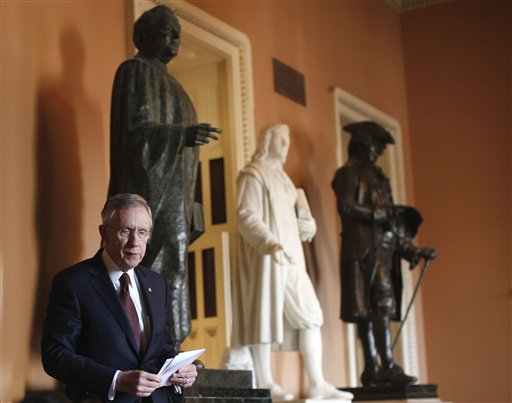Repealing President Barack Obama’s landmark health care overhaul would add billions to government red ink and leave millions without coverage, Congress’ nonpartisan budget referees said Thursday ahead of a politically charged vote in the House.
House Speaker John Boehner brushed off the Congressional Budget Office analysis as emboldened Republicans, now in the majority, issued their own report arguing that Obama’s coverage expansion would cost jobs and increase budget deficits.
But Democrats seized on the CBO analysis, calling it a game changer in the battle for public opinion.
In a letter to Boehner, budget office director Douglas Elmendorf estimated repeal would increase the deficit by $230 billion from 2012 to 2021, the 10-year estimating period for budget projections. Moreover, Elmendorf said about 32 million more people would be uninsured in 2019 as a consequence.
But Boehner told reporters: “I do not believe that repealing the job-killing health care law will increase the deficit.”
The budget experts are “entitled to their opinion,” added Boehner, R-Ohio, saying that the analysts had to rely on information selectively supplied by Democrats who wrote the legislation. Not so, said the Democrats; adverse rulings by the budget office repeatedly forced them to go back and revise the bill as they were writing it.
The budget director’s verdict gave Democrats a new counterattack against Republicans elected on a promise to cut government debt. Until now, the main Democratic argument has been that repealing the law would eliminate benefits people are already receiving, from seniors facing high drug costs, to young adults who can stay on their parents’ coverage, to those in poor health who can now get insurance.
“We can’t afford to increase the deficit by nearly a quarter of a trillion dollars, especially with the very first substantive vote of the 112th Congress,” said Senate Finance Committee Chairman Max Baucus, D-Mont., one of the authors of the law.
“Republicans have to understand that health care isn’t going to be repealed,” said Senate Majority Leader Harry Reid, D-Nev. “They should get a new lease on life and talk about something else.” Reid has said he’ll block repeal in the Democratic-led Senate.
Republicans countered that even if it’s technically accurate that the health care law reduces deficits in the short run, a program that big is bound to bust the budget over the long term — and repealing it now will save money later.
“Washington, D.C. may be the only place in the country where people believe that not spending $1 trillion and not massively expanding the size and scope of government health care will increase the deficit,” said Don Stewart, spokesman for Senate Republican Leader Mitch McConnell of Kentucky.
House Republicans have named their legislation the “Repealing the Job-Killing Health Care Law Act,” and they released a report Thursday to make their case.
It challenged economic studies that have portrayed the law in a favorable light, and offered evidence from competing studies that forecast job loss and higher costs. The National Federation of Independent Business, for example, is projecting that the law could lead to the elimination of 1.6 million jobs. NFIB is suing to have the legislation declared unconstitutional.
But the House GOP report raised some questions of its own.
Using a partial quote from a Congressional Budget Office study, the Republican report suggested that the nonpartisan office agreed that the law will cause significant job losses.
In fact, what the CBO actually said was that the law will “reduce the amount of labor used in the economy by a small amount.” In the Republican report “small amount” was replaced by an ellipsis. And CBO said most of that would come not from employers cutting jobs, but from people deciding they don’t need to work as much because they can get health insurance more easily.
George Mason University health economist Len Nichols said that Republicans were trying to compare apples to oranges. “The CBO report is about people willingly withdrawing their labor,” he said. “That is quite different from jobs that employers offer workers.”
The House has scheduled a procedural vote on repeal Friday, with final action next week.
Polls show that Americans remain divided over the health care law, but there’s no clear mandate for repeal either. An Associated Press-GfK survey in November found those favoring repeal were outnumbered nearly 2-to-1 by those who said the law should be left as it is, or changed to do more.
——
Associated Press Special Correspondent David Espo contributed to this report.


